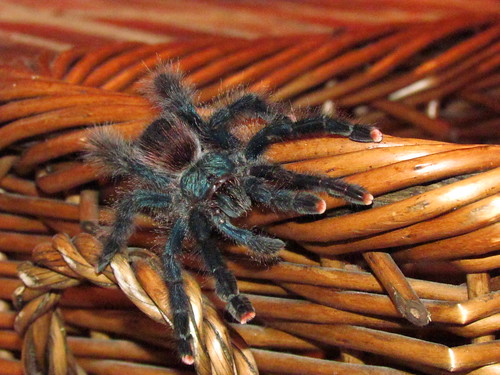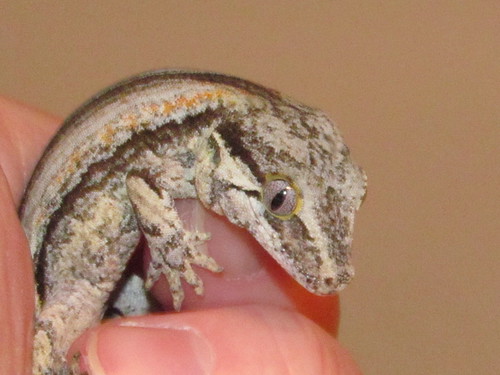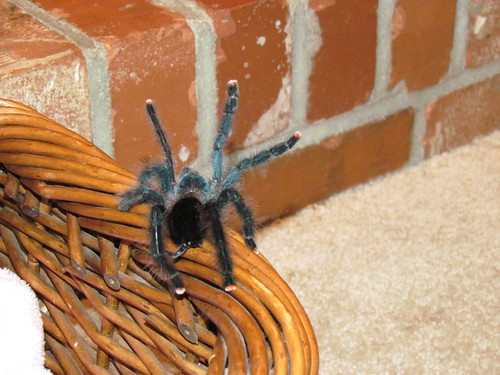In 2008, we got our first tarantula --- Sofia. We mostly got her because Arun was really into tarantulas at the time and a tarantula is a creature that needs a minimum of care. Also, it would seem that we are Those Parents who are total suckers for their child's every whim. Indeed. Oh sure, it did help that we had been visiting Sofia for months at the pet store and we already knew her to be super laidback and not skittish like Pinktoe tarantulas are normally known to be. I did some basic research on tarantula husbandry before getting Sofia and felt confident that I knew what we were in for. There were very few surprises except for the fact that apparently, you can develop real, life-like feelings for a tarantula. Feelings! Who knew?
Since Sofia, I've dived head-first into tarantulas as a hobby (I just purchased my 5th T last week. Oy.) Also, Arun has added geckos to his much-desired pet list. We've had a crested gecko (who died last year) and for his past birthday, Arun begged for a gargoyle gecko. In fact, he was given a choice between a gecko and a DSi and he still chose the gecko - as he put it "I like pets more than video games." Gentle Reader, it is difficult to resist that sort of earnest reasoning from a dewy-eyed 6 year old sporting an adorable mushroom cloud of hair.

World, meet Chloe.
Along the way of dabbling into the tarantula and gecko hobbies, I have considered other exotic pets as well. We are firmly entrenched in the arachnid/reptile camp for the time being, but I thought it would be nice to document some of the thought processes I go through when considering bringing a new animal into our home. Also, I've been asked all sorts of questions when it comes to exotic animal ownership and in the future, I am going to direct folks to this post.
Research
Read everything you can regarding the pet in which you are interested -- Internet, library, asking folks you know who are in the hobby. Also, most of the hobbies have message boards -- cruise a few of those. It will give you an idea of the sort of crowd you are joining, in addition to any hot topics regarding the hobby. (To Handle or Not To Handle Your Tarantula is a HUGE issue amongst the arachnid enthusiasts and the topic usually garners some heated commentary.)
It also helps to get a feel for what you want to look for in a healthy specimen of what you are wanting to buy - go to a pet store or hobbyist gathering to actually SEE the animal. I learned this the hard way -- I had done all the bookwork on crested geckos but realize now that I did not handle nearly enough of them to get a feel for personality (and I had handled mostly adults, not hatchlings.) I ended up buying a crested who was pretty sluggish and at the time, I thought he was laid back. Now, I realize a crested hatchling should do quite a bit more scampering and jumping around than ours did. I now suspect that our crested was probably not in good health when we bought him.
Age and Gender Does Matter
Often, baby critters are cheaper, but that comes at a cost because it is riskier - an adult has a more established history of health and behavior and therefore, is a safe buy. However, buying a baby is fun because you get to watch your wee one grow. If you do buy a baby, ask the owner how many feedings the animal has had (my store's owner likes his reptile hatchlings to have at the very least, 3 feedings to get a gauge as to health). Also, in many animals, there are striking differences in appearances and color variations between the male and females. Try to get a look at both lads and lasses before making your decision. And! Even more importantly, there can be differences in life spans between genders -- male tarantulas can be found cheaper quite simply because they do not live as long as females.
Allergies and Other Health Concerns
Allergies aren't just for cats and dogs. Tarantulas are venomous, but are not fatal unless you are allergic to bees. Tarantulas also kick off uricating hairs which are painful and itchy -- they seem to affect Arun even more so since he already deals with some skin allergies. Reptiles, amphibians, turtles, tortoises may carry salmonella and it is extremely important to wash your hands after every interaction. Folks with compromised or lowered immune systems need to carefully consider these concerns.
I had him wear gloves, in case Chloe decided to kick a few hairs. Her biting him? Not statistically likely.
Food Source
What will your pet eat? Is the food source expensive? Is there a pet store convenient to your house for getting the food source? What is the feeding schedule? For example, I would love to have a bearded dragon, but I really don't like crickets. Unless I want to be going to the pet store every other day, I would have to essentially keep a cricket farm in my house. We settled on crested and gargoyle geckos because they are a happy medium -- they will eat the occasional cricket and otherwise live on a rehydrated fruit product called Repashy. Conversely, tarantulas only need a few crickets here and there - about every other week or so. I live very near to the pet store and it is quite easy to just cruise through, pick up some crickets and head back home.
Another example is that Arun really wants a snake, but I could not handle buying the food source -- MICE. Sweet, furry, adorable MICE. When Arun can actually drive himself to the pet store to procure mice, I am perfectly okay with him getting a smaller snake -- for example, a corn snake or a ball python (NO Burmese pythons in my home. EVER.) Until then, there will be no snakes in our house because I cannot buy a pinkie, then throw it into a cage and hear it squeal as it meets its doom. I simply cannot. Come to think of it, as much as I hate squirrels, perhaps I should rereconsider that Burmese python.
Life Span
How long will your pet live? Some pets, such as parrots and giant tortoises, can live past your own lifetime. Are you committed to caring for that pet throughout its life? Do you have a plan for your pet should your pet outlive YOU? If your pet has a shorter life span, are you emotionally okay with letting it go? Last year, I bought a male Pinktoe tarantula. I knew that Daniel's bargain price of $15 meant that his time on Earth was limited -- once a male tarantula is mature, they will die during their next attempt at molting (the process where a tarantula sheds its entire exoskeleton, in addition to mouth parts and sexual organs). Sure enough, last month Daniel attempted to molt and died. I was sad, but since I had made an informed decision when I bought him, I was not shocked when he died.
This is Gordon the Gecko, Jr. I sure as hell hope he lives longer than Gordon the Gecko, Sr.
Source of Knowledge and Supplies
I have been very lucky in that I have always had a good pet store nearby who employed knowledgable and responsible employees. Someone selling you an exotic pet might actually be a bit hesitant to sell you a pet -- my pet store even has a document that must be signed. Don't be offended if the pet store employee asks YOU some questions regarding your purchase. A responsible pet store simply wants to ensure their animals go to a permanent, safe home since buyer's remorse can hurt everyone, including the animal.
Hobby Shows and Conventions
Be very wary of buying an animal from a show or convention if this is your first purchase. I bought our crested at a convention and I do believe that was part of the problem. Looking back, I wasn't as informed on the subject as I should have been and I think I made a mistake on that purchase (for example, I had primarily handled juvenile/adult cresteds when doing my research -- I was not as familiar with hatchlings). Conversely, I have no hesitations on buying a tarantula at a show because I have been in the hobby for several years now and have a much better idea of what I am looking for and which questions to ask.
Expenses
Oh sure, that pet might be on sale or appear to be reasonably priced, but he is going to have needs. Food costs money - crickets are cheap, mice are not. Enclosures and accessories are not free. Substrate and cage liners are another consideration.
Anjali has proven empirically that it is far cheaper to build a tarantula and a cage out of Legos (including a blue web.) As you can see, she is very proud of her creation.
Space
Last year, someone was giving away a really cool red-eared slider turtle. I would have loved to have that animal but the space requirements were beyond what I was willing to commit to since a larger turtle needs both a dry and aquatic environment. Furthermore, turtles live for a long time! (See: Life Span) Also consider that if you have bought a baby, that baby will grow, which means more space and potentially bigger enclosures. I now own a variety of enclosures for a variety of sized tarantulas. (And yet, my husband still sleeps with me at night. \)
Care
Tarantulas are minimalists in the care area. I give water about once a week, mist their cages occasionally and throw in a few crickets here and there. Depending on the state of their enclosures, I only clean them every month or so. Conversely, the fish and the gecko have to be fed every day. The gecko needs his cage misted at least every other day. The fish and the gecko poop considerably more than the tarantulas (Rule #1 of Pets: Everyone Poops!) Some animals need a consistently maintained environment - both temperature and humidity need to be considered. When the pilot light on our furnace went out, our house got really cold until we re-lit it. the next morning I lost sleep that night worrying about the gecko getting too cold and spent the night checking on him and trying to snuggle him (He was not as appreciative as you'd suspect.). From a care and handling perspective, I would be okay with a variety of lizards and even a snake, but I have issues with their eating habits (See: Food Source) A dream of mine is to have a veiled chameleon, but I doubt it will ever happen -- chameleons are such emotionally and physically sensitive creatures and their setups are fairly expensive, pretty high maintenance. I am not sure I could give a chameleon the detailed care and specific environment it needs.
Handling
Do you want a pet that you can actually pet? A gecko or a bearded dragon doesn't mind handling. On the other hand, as mentioned, a chameleon does not do well with excessive handling. Various types of tarantulas don't mind handling, but are YOU okay with handling? Even if your pet is mostly in his cage, at some point that pet needs to be removed from the cage while you clean it. In short, you WILL be handling your pet at some point. Whether you like it or not. (If not, you can use this handy, dandy guide to trapping your animal. Works for mice and tarantulas. Dogs? Not so much.)
We don't handle our tarantulas a lot, I actually don't think they enjoy it. We do, however, let them roam around once in awhile. And occasionally play with the Angry Birds.
And now, I shall open the floor to you. Do you have other questions? For those of you also experienced in this area, is there anything that I might have missed?




3 comments:
This is strongly implied in your post, but since I live in Florida where we are infested (literally) with exotic pets that have escaped or were released I am going to say it out loud. For the love of all you hold dear, do NOT get an exotic pet unless you are willing to keep it absolutely secure and go through the effort of finding it a new home in the event you end up in over your head. I'm sure none of the RR readers are like the crazy people down here who have released snakes who grow large enough to eat our dogs and SMALL CHILDREN. But, even the infestation of iguanas in south Florida has proven terrible for our environment, though it doesn't get the attention that the snakes in the everglades (or neighborhoods) do. And, of course, if you live in the north where they won't survive, its cruel to the pet. If you are thinking about getting an exotic pet (or any pet, now that I think about it), please please please follow Kelly's excellent example of commitment and research. Those of us who see part of our tax revenue go towards animal trappers to rid us of exotic pets running wild thank you in advance.
Cara! Yes!
I will update my post later to include your comment. I should have more clear in WHY all of these things are so important to consider.
Thank you for pointing this out!
I have a tarantula named Jake! :) But I guess he is actually more of a 'Jackie' seeing how he is now 13 years old.
Post a Comment